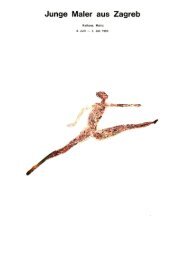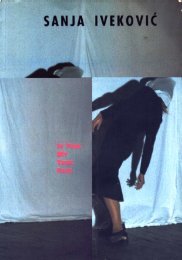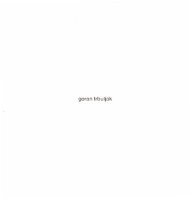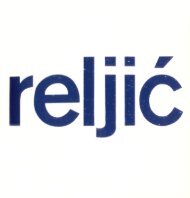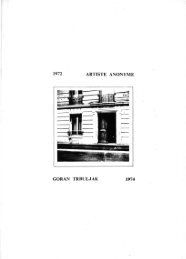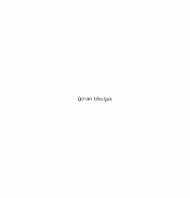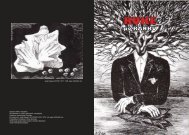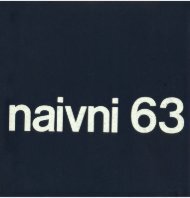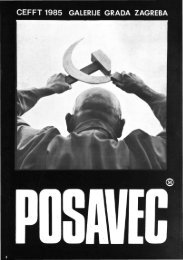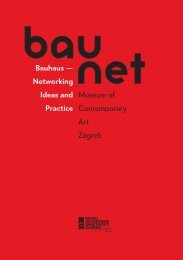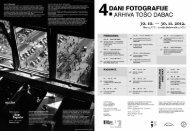Chen Zhen - Muzej suvremene umjetnosti Zagreb
Chen Zhen - Muzej suvremene umjetnosti Zagreb
Chen Zhen - Muzej suvremene umjetnosti Zagreb
You also want an ePaper? Increase the reach of your titles
YUMPU automatically turns print PDFs into web optimized ePapers that Google loves.
C. Z. Family history and sub-consciousness may actually have played a part. My parentsgraduated in the thirties and forties from one of the most prestigious universitiesin Shanghai, which was founded by the French. I remember that when theywanted to discuss something we children were not allowed to hear, they would talkin English. When we leamed English they switched to French. Now, they can nolonger do that either, they no longer have their secret language ...N. B. Perhaps nowadays they have no secretsfrom you?C. Z. [Laughing] Since we've all grown up aw family has become very democratic. andwe share everything ...N. B. It seem s that your "[amily history", its intellectual inspirations, played a morecrucial role in your being open to others and to different experiences than did yoursocial environment and the general climate in the refarmed China. What did the invitationto come to Croatia,and to create cl workfor cl total alien environment, mean toyou? Doyou find any similarities with your native land, bearing in mind thefact thatboth peoples have 1ivedundercommunism - even though its versions differed greatly?c. Z. For me, Eastern Europe today has two dimensions. One is the historical dimension,in which there are similarities with China - all the way to the fall of the BerlinWall. The second is its present, the problems faced by countries undergoing transition.Here, I do not see many similarities between Croatia and China. The communistsystem you experienced was vastly different from the one existing in China, eventwenty or thirty years ago. <strong>Zagreb</strong>, and even in Russia (two or three years ago l spenta month in St. Petersburg working on an exhibition) things were so different fromChina in so many ways: in religion, history, architecture, urban life. social customs,way of life ... Life in <strong>Zagreb</strong> is so much more European. J talked a lot with studentswhile we were setting up the <strong>Zagreb</strong> exhibition. They toId me about all the thingsthat were happening during the war in Croatia and in Bosnia &: Herzegovina. J wasvery interested in all that. I was particularly interested in observing, investigating,indeed experiencing the changes which occurred in this transitional period. What lifeis like in the <strong>Zagreb</strong> of today, this city with its entire historical heritage; what it's liketo open up towards the country and its culture. I wanted to find out which economicand cultural changes have occurred, and how they were affecting culture.The <strong>Zagreb</strong> exhibition also came about as the result of my own artistic orbit, and thepath of encounters with different people, different cultural contexts. I find workingon a prcject in a particular country, in a different social and political context, whichpreviously I knew nothing about, enormously challenging. When l'rn working in anew environment, my work is based on two different sets of experience. One is the"exhibition area experience", Le. experience of specific exhibition premises; encounterswith the world of museums, with the context of the place. The second is encounterswith ordinary people in daily life situations. In my discourse with students,young artists - and that happens in all East European countries that have undergonethe traumatic experiences of transition - I noticed that they are striving to preservetheir cultural roots, while at the same time endeavouring to make inroads into the69



